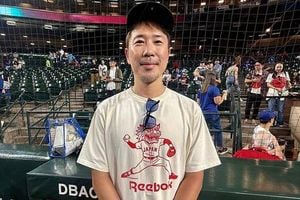Franco-Algerian writer Kamel Daoud, who recently won the prestigious 2024 Goncourt Prize for his novel Houris, is currently facing two international arrest warrants issued by Algeria. The French Ministry of Foreign Affairs announced on May 7, 2025, that it had been informed of these warrants, which have sparked significant controversy.
Daoud's legal troubles began in November 2024 when an Algerian court accepted a complaint against him and his psychiatrist wife, who is accused of using a patient’s story in the writing of Houris. The patient in question, Saâda Arbane, is a survivor of a massacre during Algeria's dark civil war, which lasted from 1992 to 2002 and resulted in approximately 200,000 deaths. Arbane claims that her story was used without her consent, leading her to file a complaint against the couple.
In addition to Arbane's complaint, another legal action has been initiated by the National Organization of Victims of Terrorism, further complicating Daoud's situation. The issuance of the arrest warrants is seen by Daoud's legal team as politically motivated, intended to silence him due to the sensitive subject matter of his novel, which addresses the atrocities of the Algerian civil war.
"The motivations of such Algerian warrants could only be political and fit into a series of procedures aimed at silencing a writer whose latest novel evokes the massacres of the black decade in Algeria," stated Daoud's lawyer, Jacqueline Laffont-Haïk, in an interview. She emphasized that they would contest the warrants through Interpol.
Houris, which refers to the young women promised to paradise in Islamic belief, tells the harrowing story of Aube, a young woman who has been mute since an Islamist cut her throat on December 31, 1999. The novel, which cannot be published in Algeria due to a law prohibiting works that discuss the black decade, has sold over 430,000 copies since its release.
Daoud's legal challenges extend beyond Algeria. He is also facing a lawsuit in France for invasion of privacy filed by Arbane, with a first hearing scheduled for the same day as the announcement of the arrest warrants. Arbane claims that the novel contains significant similarities to her own life story, which she shared with Daoud's wife during therapy sessions.
Despite the allegations, Daoud has maintained that his work is a work of fiction and that the story is not a direct account of Arbane's life. In a statement made in December 2024 on France Inter radio, he asserted, "This story is public in Algeria, and my novel does not tell [the] life of Saâda Arbane."
His publisher, Gallimard, has also come to his defense, condemning the "violent defamatory campaigns orchestrated against the writer by certain media close to a regime whose nature is well-known." The ongoing legal battles highlight the tension between freedom of expression and the political climate in Algeria.
The French Ministry of Foreign Affairs has expressed its commitment to monitoring the situation closely, with spokesperson Christophe Lemoine emphasizing Daoud's status as a respected author and the importance of freedom of expression. "We will follow the evolution of this situation with attention," he stated.
As the situation develops, it raises broader questions about the role of literature in addressing historical trauma and the potential repercussions for writers who dare to confront painful truths. Daoud's case is not isolated; it reflects a growing concern over the treatment of artists and intellectuals in Algeria, especially those who challenge the narrative surrounding the civil war.
In light of these events, the literary community is rallying in support of Daoud, calling attention to the importance of protecting artistic freedom. The outcome of these legal proceedings could have significant implications for writers in Algeria and beyond, particularly those who seek to explore the complexities of their nation's history.
As Daoud prepares to contest the arrest warrants and defend his work in court, the literary world watches closely. Will he be able to navigate these turbulent waters, or will this be another case of an artist silenced by political pressures? Only time will tell.






